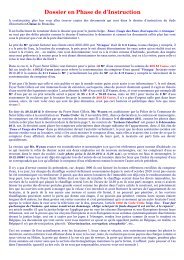What were The Nephilims in Relationship to the Sons of God
What were The Nephilims in Relationship to the Sons of God
What were The Nephilims in Relationship to the Sons of God
You also want an ePaper? Increase the reach of your titles
YUMPU automatically turns print PDFs into web optimized ePapers that Google loves.
Aga<strong>in</strong>, <strong>Sons</strong> <strong>of</strong> <strong>God</strong> take daughters <strong>of</strong> men, and<br />
<strong>God</strong> is angry with man, not angels and not angel<br />
children. Flesh and blood human be<strong>in</strong>gs !. His<br />
spirit will not always strive with man, not with<br />
angels. Man is but flesh, and his error is <strong>in</strong> <strong>the</strong><br />
flesh. In o<strong>the</strong>r words, <strong>God</strong> is go<strong>in</strong>g <strong>to</strong> br<strong>in</strong>g<br />
judgment upon him for his weakness <strong>of</strong> <strong>the</strong> flesh.<br />
<strong>The</strong> sons <strong>of</strong> <strong>God</strong> <strong>were</strong> s<strong>in</strong>n<strong>in</strong>g accord<strong>in</strong>g <strong>to</strong> <strong>the</strong><br />
flesh, by tak<strong>in</strong>g wives <strong>of</strong> <strong>the</strong> unsaved, simply<br />
because <strong>the</strong>y <strong>were</strong> fair <strong>to</strong> look upon (beautiful <strong>in</strong><br />
our vernacular). This is <strong>the</strong> reason for judgment<br />
upon <strong>the</strong> earth, it's always been !. Not because<br />
Super angels copulated with humans, but<br />
because <strong>God</strong>'s people went after strange flesh !.<br />
Let us <strong>to</strong>uch briefly on a few o<strong>the</strong>r verses that are<br />
sometimes used <strong>to</strong> try and prove <strong>the</strong>se <strong>were</strong><br />
angels.<br />
Job 1: 6.<br />
• "Now <strong>the</strong>re was a day when <strong>the</strong> sons <strong>of</strong> <strong>God</strong> came <strong>to</strong> present <strong>the</strong>mselves before <strong>the</strong> Lord, and<br />
Satan came also among <strong>the</strong>m".<br />
Job 2: 1.<br />
• "Aga<strong>in</strong> <strong>the</strong>re was a day when <strong>the</strong> sons <strong>of</strong> <strong>God</strong> came <strong>to</strong> present <strong>the</strong>mselves before <strong>the</strong> Lord", and<br />
"Satan came also among <strong>the</strong>m <strong>to</strong> present himself before <strong>the</strong> Lord".<br />
Any Bible that you have that translates <strong>the</strong>se words as angels is a mistranslation. <strong>The</strong> words sons <strong>of</strong><br />
<strong>God</strong> <strong>in</strong> <strong>the</strong>se verses are <strong>the</strong> exact same Hebrew as found throughout scripture for sons, and for <strong>God</strong>.<br />
<strong>The</strong> same <strong>in</strong> Genesis chapter 6.<br />
It's (ben 'elohiym) or (bane el-o-heem) which is literally children or <strong>Sons</strong>/<strong>God</strong>. <strong>The</strong> exact same words <strong>in</strong><br />
all <strong>the</strong> verses. Not <strong>the</strong> Hebrew word "angels" (mal'ak) or Messenger, but <strong>Sons</strong> <strong>of</strong> <strong>God</strong>. Any Bible that<br />
translates this angel is mak<strong>in</strong>g a "commentary" and not a translation <strong>of</strong> <strong>the</strong> Hebrew. And <strong>the</strong>re is a<br />
difference !. I don't m<strong>in</strong>d people mak<strong>in</strong>g commentaries, but when <strong>the</strong>y f<strong>in</strong>d <strong>the</strong>mselves on <strong>the</strong> pages <strong>of</strong><br />
scripture "as Scripture" that's when I draw <strong>the</strong> l<strong>in</strong>e. It is an unrighteous th<strong>in</strong>g for anyone <strong>to</strong> translate<br />
(ben 'elohiym) as angels when it is <strong>the</strong> Hebrew "<strong>Sons</strong> <strong>of</strong> <strong>God</strong>".<br />
If <strong>God</strong> had wanted <strong>to</strong> say angels, He very well could have had <strong>the</strong> Holy men <strong>of</strong> old use that Hebrew<br />
word He has prescribed and uses for angel throughout scripture, he didn’t.<br />
Case Closed !.<br />
Some people have been confused by <strong>the</strong> language "<strong>the</strong>y came <strong>to</strong> present (yatsab) (mean<strong>in</strong>g, <strong>to</strong> "station"<br />
or position) <strong>the</strong>mselves before <strong>the</strong> Lord". Some th<strong>in</strong>k that this means that <strong>the</strong>y went <strong>in</strong><strong>to</strong> heaven. That's<br />
not <strong>the</strong> case. We have <strong>to</strong> keep <strong>in</strong> m<strong>in</strong>d <strong>the</strong> times that we are read<strong>in</strong>g about. <strong>The</strong>se <strong>were</strong> <strong>the</strong> early years<br />
<strong>of</strong> <strong>the</strong> world. <strong>The</strong> language <strong>of</strong> "Present<strong>in</strong>g <strong>the</strong>mselves before <strong>God</strong>", is common <strong>in</strong> Biblical His<strong>to</strong>ry, and<br />
doesn't denote an appearance <strong>in</strong> Heaven. It is simply language denot<strong>in</strong>g com<strong>in</strong>g <strong>to</strong> <strong>the</strong> place or<br />
presence <strong>of</strong> <strong>God</strong> <strong>to</strong> <strong>in</strong>quire <strong>of</strong> Him. Today, we'd go <strong>to</strong> a Church and pray. That would be our com<strong>in</strong>g <strong>to</strong><br />
<strong>in</strong>quire <strong>of</strong> <strong>God</strong>. In those days, <strong>the</strong>y would have <strong>the</strong>ir own designated Holy place, and <strong>of</strong>ten <strong>God</strong> would<br />
speak <strong>to</strong> <strong>the</strong>m directly.<br />
For example <strong>in</strong>:






